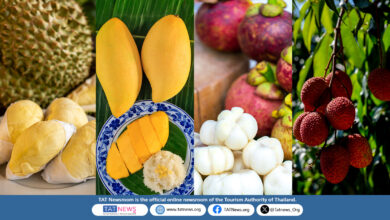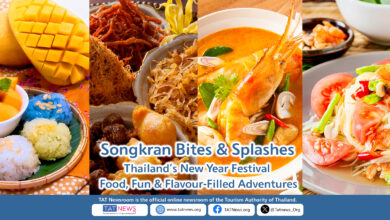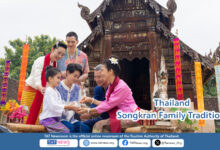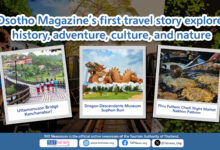The Thailand Travel Mart Plus (TTM+) Amazing Gateway to the Greater Mekong Subregion, scheduled for the first time at the Ocean Marina Yacht Club in Pattaya from 13 to 15 June 2018, invites participants to discover the region’s Amazing ‘Colours of the East’ in the coastal city and beyond.
While Pattaya remains the gateway to Thailand’s Eastern Region, its continued popularity strengthens its reputation as the region’s pre-eminent travel hub, there is also much to explore in neighbouring provinces that opens visitors to exciting new Thai local experiences.
There are many superb attractions in Rayong, Chanthaburi and Trat provinces that are best viewed through the prism of the Tourism Authority of Thailand (TAT)’s latest marketing concept of Amazing Thailand’s ‘Open to the New Shades’ highlighting a kaleidoscope of colour through five distinct travel segments.
These five main travel sectors include: Gastronomy, Arts and Crafts, Thai Culture, Nature and Thai Way of Life.
In Rayong, visitors can spend time at one of the many orchards that dot the countryside, stopping to pick and taste various kinds of fresh tropical fruits including delicious treats; such as, durian, mango, mangosteen and rambutan. The hairy red fruit of rambutan looks more like something out of a fairytale than anything grown in real life. But while this fruit may seem exotic to some, they’re a common snack throughout Thailand and especially around the country’s Eastern Region. Durians, on the other hand, which hang improbably from the trees like fruity cannonballs, are sought after by connoisseurs all over Southeast Asia and China.
In addition to fruit orchards, Rayong also offers numerous quaint seaside fishing villages, Mae Rumphueng Beach, Sunthon Phu Monument, Khao Laem Ya-Mu and Ko Samet National Park, Ko Kloi Floating Market and Thung Prong Thong to name just a few of the province’s many attractions.
[su_slider source=”media: 55472,55467,55452,55443,55448,55447,55446,55445″ link=”image” target=”blank” width=”1000″ height=”800″ autoplay=”0″]Culturally eclectic Chanthaburi remains home to large Chinese, Khmer and Vietnamese communities and was also influenced by the French, who ruled the area from 1893 to 1905. This mixed heritage is evident in both the food and architecture that line the city’s narrow streets, and an exploration of the labyrinth of lanes is perhaps the most fascinating way to get a sense for the diversity of Chanthaburi.
A stroll through the Chanthaboon Riverside Community is a must for culture-oriented travellers. It’s also the literal home to some of Thailand’s most precious gems, as the city is the centre of Thailand’s lucrative precious stone trade. With its glittering jewels, French-influenced architecture, artsy riverside atmosphere, dazzling temples and churches, plus a delicious mix of local food, the area is truly a living time capsule offering a glimpse of a bygone era.
Another non-Thai influence is found across from the Chanthaboon Riverside Community in the form of Thailand’s largest church: The Cathedral of the Immaculate Conception. First built by European missionaries way back in the early 1700s, the Cathedral was rebuilt in its current gothic style mainly by Vietnamese migrants in the early 20th century.
On the coast, Kung Krabaen Bay Royal Development Study Centre is the region’s leading research facility dedicated to preserving Thailand’s marine biodiversity. Open daily from 08.00-18.00 Hrs., it allows visitors to view its important preservation work with sea turtles, sharks, giant grouper in addition to educating local fishing communities on crab breeding and oyster propagation.
A few other gems of Chanthaburi include Chao Lao Beach, Phlio Waterfall, Oasis Sea World, Noen-Nang Phaya Viewpoint and the landless village of Rai Pandin.
[su_slider source=”media: 55468,55462,55466,55470,55465,55469″ link=”image” target=”blank” width=”1000″ height=”800″ autoplay=”0″]TRAT
Trat encompasses numerous islands with white sandy beaches and coral reefs, many of which lie within the Mu Ko Chang National Park. The largest is Ko Chang, known for its dense jungle, waterfalls and offshore coral reefs, while neighbouring Ko Kut is possibly Thailand’s most pristine eco-friendly island.
The province also offers authentic Thai local experiences not easily found elsewhere.
Ban Tha Ranae Community offers homestays and a glimpse of life in thriving mangrove wetlands. The Community is dedicated to preserving its natural resources and coastal heritage through sightseeing boat tours through the mangrove forests and mud clam breeding.
Ban Huai Raeng Community offers homestay experiences rich in Thai food and local handmade products. Visitors are invited to learn how to make mangosteen soap, gel soap and skin masks. There are also cooking demonstrations on local desserts including khanom chak (Nipa palm leaf wrapped glutinous rice cake) and betel leaf wrapped rice packets that use all organic materials.
A visit to the Trat Museum is a must. It highlights the province’s rich history including its confrontations with the French in the early and mid-20th century. The Museum occupies an attractive wooden replica of the old provincial hall, originally built in 1922. After the original building burned down in the mid-2000s, a new structure was rebuilt with gingerbread woodcarvings, ceramic shingles and slender pillars that makes visitors think it is an actual heritage building that was restored.
Any visit to Trat also offers a chance to experience the narrowest part of Thailand at Khlong Yai sub-district, the mainland’s Sai Khao Beach (white sand beach), Bang Bao fishing village and Wat Buppharam, Trat’s oldest temple first built in 1652.
[su_slider source=”media: 55464,55461,55463,55471,55473″ link=”image” target=”blank” width=”1000″ height=”800″ autoplay=”0″]All told Rayong, Chanthaburi and Trat are three of Thailand’s most underrated provinces. They all boast pleasant natural attractions, national parks and low-key beach towns, with the unsung provincial capitals hosting charming old towns and rich cultural heritage.






